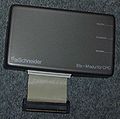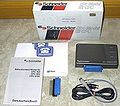Difference between revisions of "Schneider BTX Modul"
m |
|||
| (14 intermediate revisions by 4 users not shown) | |||
| Line 1: | Line 1: | ||
| − | Schneider | + | == Description == |
| + | |||
| + | Schneider BTX module for the CPC. The hardware design is based on a universal BTX decoder made by Siemens. It is connected to the CPC's expansion port and additionally hooked in between computer and monitor. The module must also be connected to a BTX modem with a D-BT 03 port. These modems were provided by the Deutsche Post and had to be returned after use, because the BTX subscriber ID was hard-coded within the device. | ||
* Type: PC/HC-Decoder | * Type: PC/HC-Decoder | ||
| Line 8: | Line 10: | ||
* Protocol: CEPT | * Protocol: CEPT | ||
* ID Numbers: P07747, Siemens S30817-K732-A101-1 / A30817-X732-A100-1, Schneider Ident Nr. 36445 or 36486 | * ID Numbers: P07747, Siemens S30817-K732-A101-1 / A30817-X732-A100-1, Schneider Ident Nr. 36445 or 36486 | ||
| − | + | ||
| + | == Bildschirmtext (BTX) == | ||
| + | |||
| + | BTX (Bildschirmtext, translated as Screentext) has been a German service, allowing to transfer data via telephone line. In the 8bit era, the Deutsche Bundespost (German postal service) still owned the monopoly for telecommunications in Germany, so the only legal way to transmit electronic data via telephone line has been to use their BTX service. The service was ultimatively suspended in 2007. | ||
| + | |||
| + | Beginning in late 2019, some work has begun to revive parts of the BTX service. There are [https://btx-museum.de/2020/02/29/der-neue-dbt-03-emulator/ emulators providing D-BT 03 ports], and some BTX pages were [https://www.heise.de/newsticker/meldung/36C3-Congress-wie-1984-mit-BTX-und-Originalarchiven-4624507.html restored by feeding recordings of original modem sessions to software demodulators]. | ||
| + | |||
| + | == Pictures == | ||
<gallery> | <gallery> | ||
| + | File:SchneiderBtxModulCPC.jpg | ||
| + | File:SchneiderBtxModulCPC-close.jpg | ||
File:SchneiderBtxModulCPC36486.jpg | File:SchneiderBtxModulCPC36486.jpg | ||
File:SchneiderBtxModulCPC36486-2.jpg | File:SchneiderBtxModulCPC36486-2.jpg | ||
</gallery> | </gallery> | ||
| − | + | == Case == | |
| + | |||
| + | '''Note''': Schneider also made a BTX module for Schneider Television Sets, although that device had nothing to do with the CPC, its housing was later re-used for the CPC's [[Schneider RS232 Interface]]. | ||
| + | |||
| + | == Weblinks == | ||
| + | |||
| + | * http://en.wikipedia.org/wiki/Bildschirmtext - wikipedia article on BTX (english, short description) | ||
| + | * http://de.wikipedia.org/wiki/Bildschirmtext - wikipedia article on BTX (german, more detailed description) | ||
| + | * https://btx-museum.de/2020/02/29/der-neue-dbt-03-emulator/ (german) | ||
| + | * https://www.heise.de/newsticker/meldung/36C3-Congress-wie-1984-mit-BTX-und-Originalarchiven-4624507.html (german) | ||
| + | |||
| + | [[Category:Network]] | ||
Latest revision as of 05:47, 23 October 2021
Description
Schneider BTX module for the CPC. The hardware design is based on a universal BTX decoder made by Siemens. It is connected to the CPC's expansion port and additionally hooked in between computer and monitor. The module must also be connected to a BTX modem with a D-BT 03 port. These modems were provided by the Deutsche Post and had to be returned after use, because the BTX subscriber ID was hard-coded within the device.
- Type: PC/HC-Decoder
- Country: Germany
- OEM: Siemens
- Year: 1987
- Connectors: D-BT 03, RGB for Monitor or colorprinter
- Protocol: CEPT
- ID Numbers: P07747, Siemens S30817-K732-A101-1 / A30817-X732-A100-1, Schneider Ident Nr. 36445 or 36486
Bildschirmtext (BTX)
BTX (Bildschirmtext, translated as Screentext) has been a German service, allowing to transfer data via telephone line. In the 8bit era, the Deutsche Bundespost (German postal service) still owned the monopoly for telecommunications in Germany, so the only legal way to transmit electronic data via telephone line has been to use their BTX service. The service was ultimatively suspended in 2007.
Beginning in late 2019, some work has begun to revive parts of the BTX service. There are emulators providing D-BT 03 ports, and some BTX pages were restored by feeding recordings of original modem sessions to software demodulators.
Pictures
Case
Note: Schneider also made a BTX module for Schneider Television Sets, although that device had nothing to do with the CPC, its housing was later re-used for the CPC's Schneider RS232 Interface.
Weblinks
- http://en.wikipedia.org/wiki/Bildschirmtext - wikipedia article on BTX (english, short description)
- http://de.wikipedia.org/wiki/Bildschirmtext - wikipedia article on BTX (german, more detailed description)
- https://btx-museum.de/2020/02/29/der-neue-dbt-03-emulator/ (german)
- https://www.heise.de/newsticker/meldung/36C3-Congress-wie-1984-mit-BTX-und-Originalarchiven-4624507.html (german)



